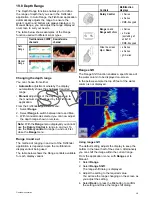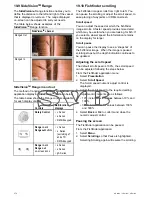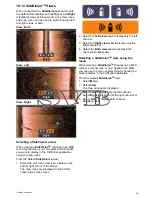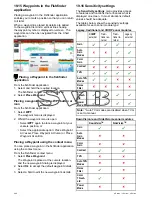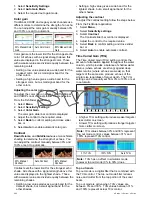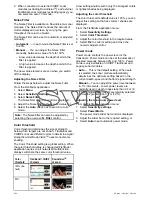
Depth data source
Where multiple sources of depth data exist on a
system and the depth Data Source is set to Auto the
system will automatically select the optimum source
for depth data.
The system will set the data source for depth
according to the priority table below:
1
st
CP450C
SeaTalk
hs
2
nd
CP300
SeaTalk
hs
3
rd
DSM300
SeaTalk
hs
4
th
DSM30
SeaTalk
hs
5
th
Traditional
sonar variant
multifunction
displays
SeaTalk
hs
/ internal
6
th
DownVision
TM
variant
multifunction
display
SeaTalk
hs
/ internal
7
th
CP100
SeaTalk
hs
8
th
Instrument /
multifunction
display
SeaTalk
ng
9
th
Instrument
SeaTalk
10
th
Instrument /
multifunction
display
NMEA 0183
If multiple sonar modules of the same type are
present on a SeaTalk
hs
network then the unit with
the highest serial number will be selected as the
preferred data source. For SeaTalk
ng
and NMEA
0183 networks the unit with the highest CAN address
is selected.
If the preferred depth data source becomes
unavailable then the system will automatically select
the next highest priority data source.
Refer to the
Data Source menu
section for details on
selecting preferred data sources.
Important:
A depth offset must be set for all
installed transducers to ensure consistent and
accurate data is shown. Refer to the
Depth Offset
section for details.
Note:
SideVision
TM
cannot be used as a source
for depth data.
19.5 Sonar crosstalk interference
There are 2 types of potential sonar crosstalk
interference in a Raymarine sonar system:
1.
SideVision
sonar crosstalk interference
2.
Multiple sonar crosstalk interference
The types of crosstalk interference that you
may experience in your system depend on the
combination and type of sonar equipment installed,
and the way in which the equipment has been
installed.
SideVision sonar crosstalk
interference
Multiple sonar crosstalk
interference
Due to the high sensitivity
of
SideVision
transducers,
you may experience some
minor crosstalk interference
between the left and right
receiving channels in areas
of strong target returns.
Examples of strong target
returns include solid objects
such as underwater bridge
structure. This interference
shows up in the Fishfinder
application as subtle
reflections from the right
sonar image displayed in
the left sonar image, or vice
versa.
When using multiple sonar
modules and transducers
operating in overlapping
frequency ranges, you may
experience some crosstalk
interference between the
ranges. This interference is
displayed in the Fishfinder
application as vertical “rain
drops” throughout the water
column. These vertical “rain
drops” indicate that 2 sonar
modules are operating in
close frequency proximity to
one another.
SideVision sonar crosstalk interference
Crosstalk interference is expected behavior in a high
sensitivity device such as a
SideVision
transducer,
and is not indicative of a fault with your transducer or
sonar module.
Reducing multiple sonar crosstalk
interference
Crosstalk interference in systems with multiple sonar
modules and transducers is the result of a number
of factors, including installation, operation, and
environment.
•
Choose an equipment combination that
minimizes overlapping frequencies.
Wherever
possible, choose to use sonar modules and
transducers that operate in different frequency
ranges (“Channels”), for example CP100 and
CP300 sonar modules and CPT-100 and B744V
transducers. This will help to ensure that each
component is operating in a distinct relative
frequency range – for example, a “high” frequency
range for the CP100 and a “low” frequency range
for the CP300.
•
Only use the sonar channels that you really
need.
Although it is possible to run multiple sonar
Fishfinder application
269
Summary of Contents for c125
Page 2: ......
Page 14: ...14 a Series c Series e Series ...
Page 41: ...13 GPS receiver 14 Thermal camera 15 Wireless connection Planning the installation 41 ...
Page 48: ...48 a Series c Series e Series ...
Page 80: ...80 a Series c Series e Series ...
Page 118: ...118 a Series c Series e Series ...
Page 184: ...184 a Series c Series e Series ...
Page 188: ...188 a Series c Series e Series ...
Page 206: ...206 a Series c Series e Series ...
Page 228: ...228 a Series c Series e Series ...
Page 290: ...290 a Series c Series e Series ...
Page 310: ...310 a Series c Series e Series ...
Page 340: ...340 a Series c Series e Series ...
Page 374: ...374 a Series c Series e Series ...
Page 422: ...422 a Series c Series e Series ...
Page 436: ...436 a Series c Series e Series ...
Page 462: ...462 a Series c Series e Series ...
Page 463: ......
Page 464: ...www raymarine com ...



















